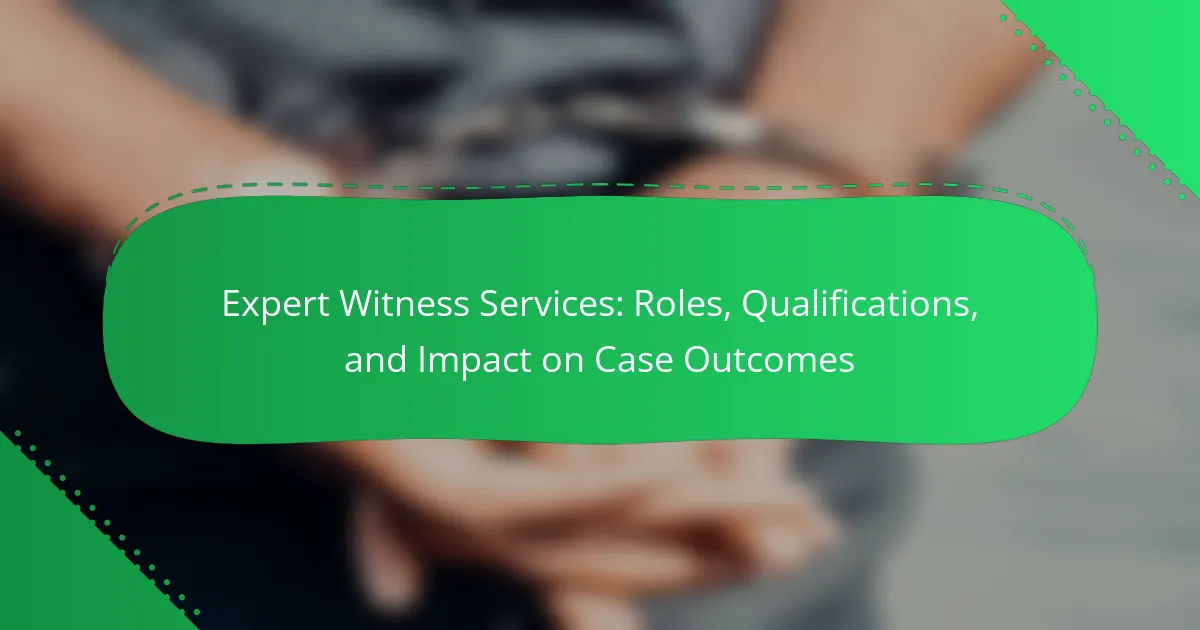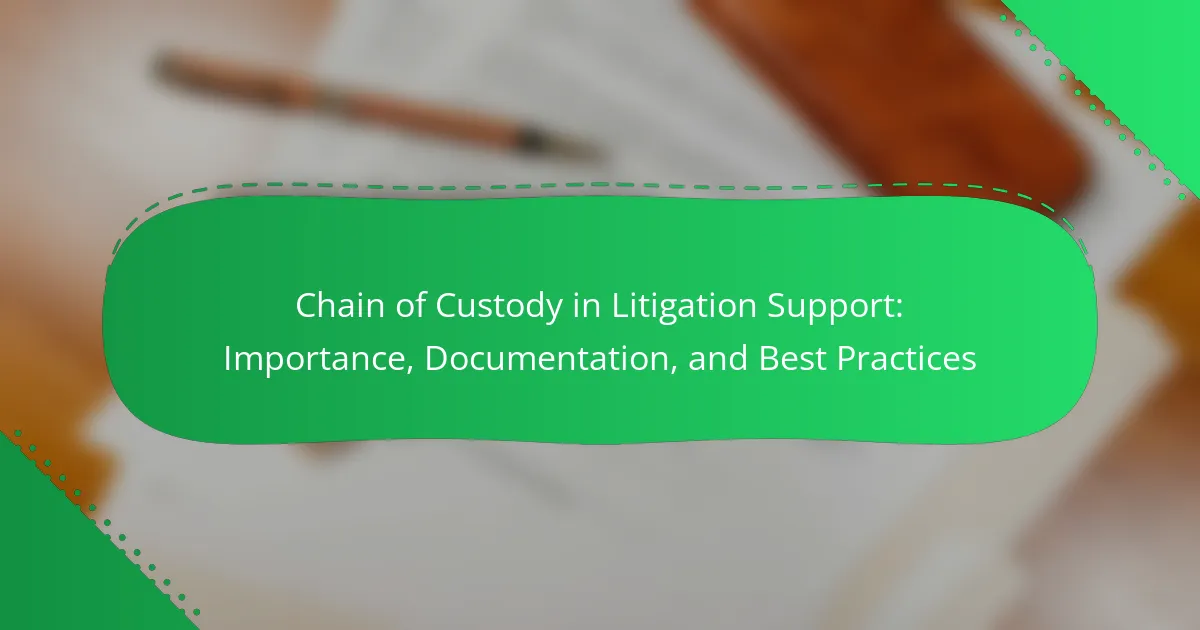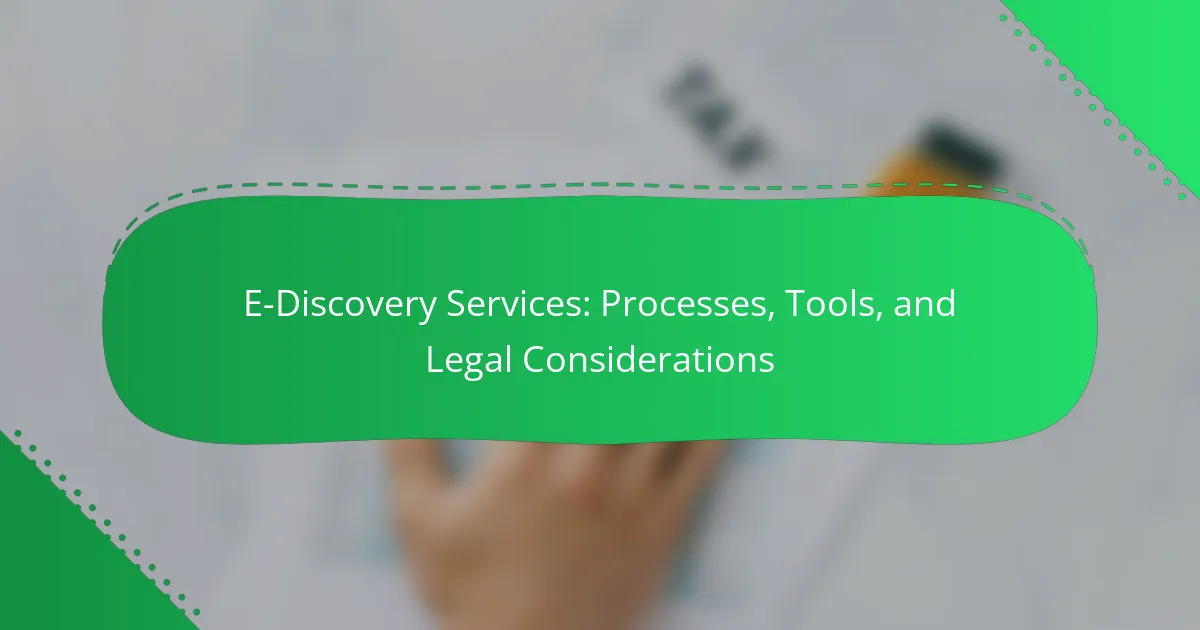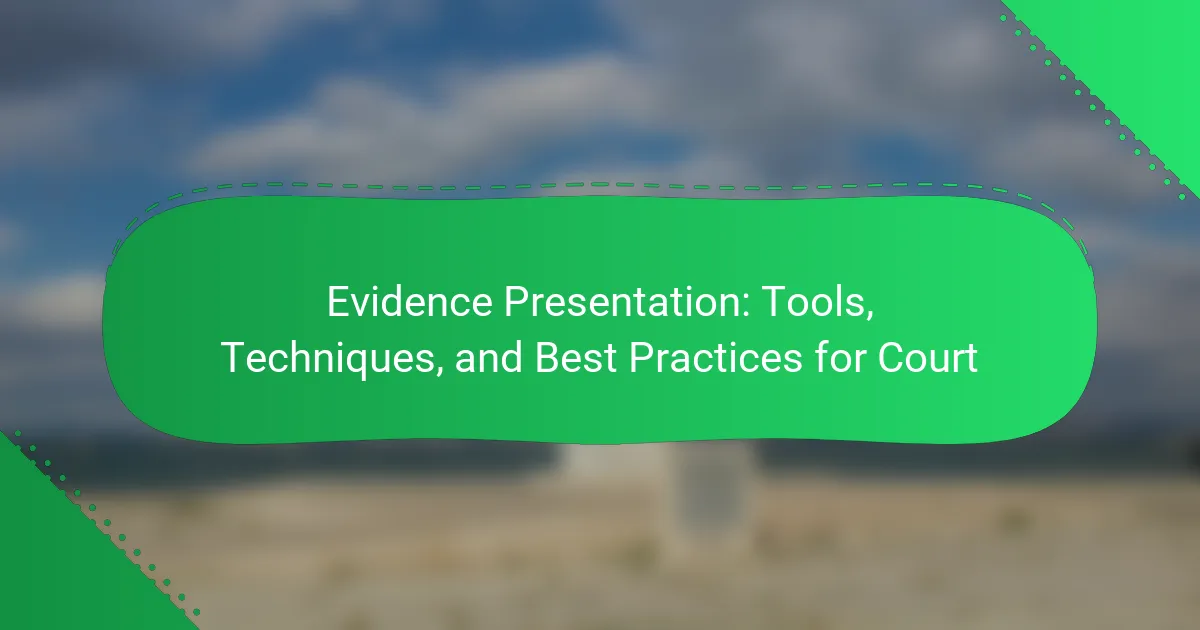Expert witness services provide specialized knowledge and testimony in legal cases, playing a crucial role in clarifying complex issues for the court. These professionals, often from fields such as medicine, engineering, or finance, analyze evidence and present their findings to help juries understand technical aspects of cases. The article explores the various types of expert witnesses, including medical, forensic, and engineering experts, each serving distinct functions in legal proceedings. Additionally, it addresses the challenges faced by expert witnesses, such as maintaining credibility, navigating legal complexities, and managing costs, which can affect their effectiveness and reliability in influencing case outcomes.
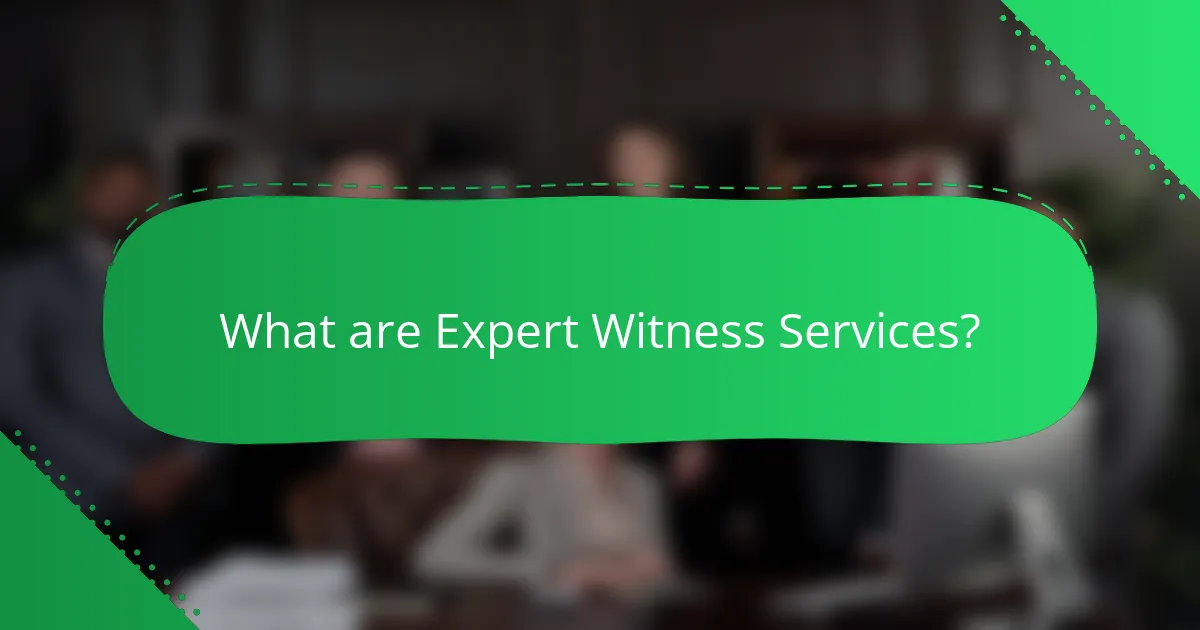
What are Expert Witness Services?
Expert witness services provide specialized knowledge and opinions in legal cases. These services are often utilized in court proceedings to clarify complex issues. Expert witnesses analyze evidence and offer expert testimony based on their expertise. Their insights can significantly influence case outcomes. Typically, these professionals come from various fields such as medicine, engineering, or finance. They are expected to present their findings in an understandable manner. Their credibility is often established through education, experience, and prior work. Courts rely on expert witnesses to help juries understand technical aspects of a case.
How do Expert Witness Services function in legal proceedings?
Expert witness services function by providing specialized knowledge to assist in legal proceedings. Experts evaluate evidence, offer opinions, and explain complex subjects to judges and juries. They are typically called upon in cases requiring technical or specialized insight, such as medical malpractice or engineering disputes. The expert prepares a report summarizing findings and may testify in court. Their testimony aims to clarify issues that are beyond the understanding of laypersons. The credibility of an expert is often established through their qualifications, experience, and the relevance of their expertise to the case. Courts rely on expert witnesses to ensure informed decision-making based on factual analysis.
What roles do expert witnesses play in court cases?
Expert witnesses provide specialized knowledge in court cases. They assist in clarifying complex issues for judges and juries. Their testimony can influence the outcome of a case significantly. Expert witnesses analyze evidence and offer opinions based on their expertise. They may also prepare reports and participate in depositions. Their qualifications often include advanced degrees or extensive experience in their field. Courts rely on expert witnesses to establish facts that are beyond common understanding. This role ensures that legal decisions are informed by credible and relevant information.
How is the testimony of an expert witness utilized?
The testimony of an expert witness is utilized to provide specialized knowledge in legal cases. Expert witnesses clarify complex information for judges and juries. Their insights help in understanding technical or scientific evidence. Courts rely on expert testimony to establish facts that require expertise. This testimony can influence case outcomes significantly. For instance, a medical expert may testify about injuries in personal injury cases. Similarly, a financial expert can analyze economic damages in business disputes. The credibility and qualifications of the expert impact the weight of their testimony.
What qualifications are necessary for an expert witness?
An expert witness must have specialized knowledge, skills, or experience in a particular field. This expertise is typically established through education, training, and practical experience. Relevant qualifications often include advanced degrees or certifications in their area of expertise. Additionally, they should have a track record of professional work and publications in their field. Courts may also consider the expert’s ability to communicate complex information clearly. These qualifications ensure that the expert can provide credible and reliable testimony. The Federal Rules of Evidence emphasize the importance of expertise for admissibility in court.
What educational background is typically required?
Typically, a bachelor’s degree is required for expert witness services. Many experts hold advanced degrees, such as a master’s or doctorate, in their field of expertise. Relevant fields include law, medicine, engineering, and finance. Professional certifications may also enhance credibility. Experience in the specific area is crucial for providing reliable testimony. Courts often prefer experts with extensive knowledge and a strong educational foundation. This background ensures the expert can effectively communicate complex information.
How does professional experience influence qualifications?
Professional experience significantly enhances qualifications by providing practical knowledge and skills. It allows individuals to apply theoretical concepts in real-world scenarios. This hands-on experience is critical for expert witnesses, as it builds credibility. For instance, a forensic accountant with years of experience can offer insights that a newly qualified individual may lack. Research shows that professionals with extensive experience are often preferred in legal cases. Their ability to articulate complex information clearly is also improved through experience. Overall, professional experience directly correlates with the depth and reliability of qualifications.
What impact do Expert Witness Services have on case outcomes?
Expert witness services significantly influence case outcomes. Their specialized knowledge can clarify complex issues for judges and juries. Expert witnesses provide credible testimony that can enhance the persuasiveness of a case. Research shows that cases with expert witnesses are more likely to result in favorable verdicts. A study by the National Center for State Courts indicates that expert testimony increases the likelihood of success in litigation. The credibility of an expert can also affect settlement negotiations, often leading to more favorable settlements for plaintiffs. Overall, expert witness services are crucial in shaping the direction and outcome of legal cases.
How can expert testimony affect jury decisions?
Expert testimony can significantly influence jury decisions by providing specialized knowledge that aids in understanding complex issues. Jurors often rely on expert witnesses to clarify technical aspects of a case. This guidance can shape their perceptions of evidence and arguments presented. For instance, a forensic expert may explain DNA evidence, making it more comprehensible for jurors. Studies show that jurors are more likely to trust and follow recommendations from credible experts. Additionally, the presence of expert testimony can enhance the perceived legitimacy of a party’s claims. This can lead to more favorable outcomes for the side that presents compelling expert evidence.
What are the potential consequences of using expert witnesses?
The potential consequences of using expert witnesses include both benefits and risks. Expert witnesses can provide specialized knowledge that clarifies complex issues for judges and juries. Their testimony may significantly influence case outcomes, potentially leading to favorable rulings. However, reliance on expert witnesses can also introduce challenges. Their opinions may be contested by opposing experts, creating disputes that complicate cases. Additionally, if an expert’s credibility is questioned, it can undermine the case. Misleading or biased testimony can result in unfavorable judgments. Courts may also scrutinize the qualifications of expert witnesses, impacting their admissibility. Overall, the use of expert witnesses carries weighty implications for legal proceedings.
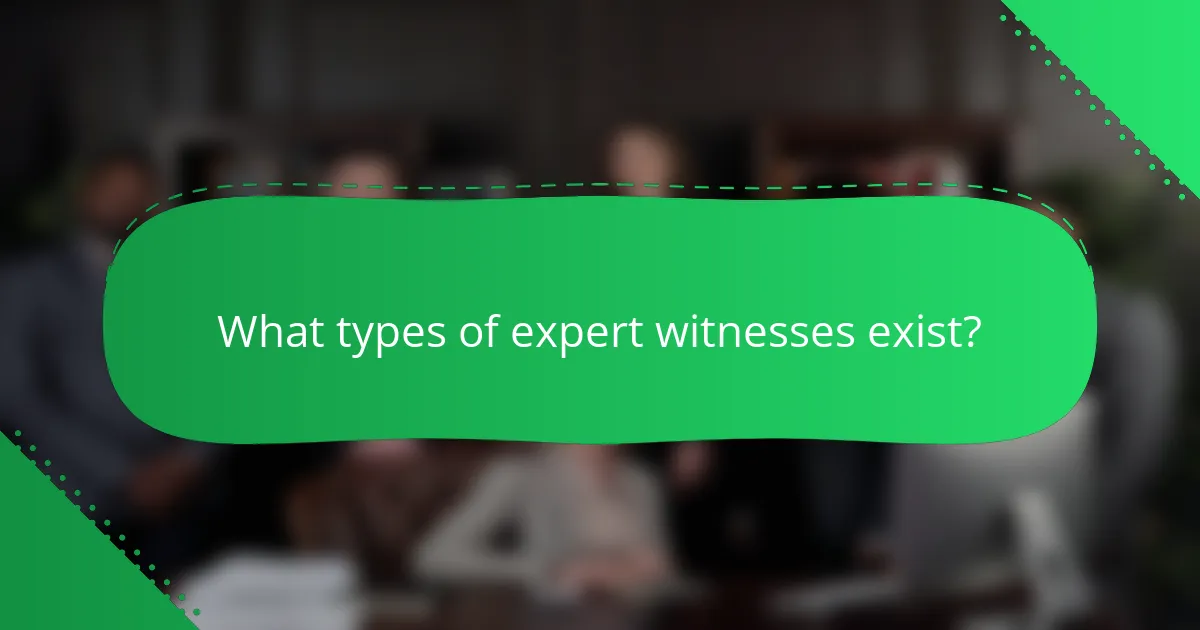
What types of expert witnesses exist?
There are several types of expert witnesses. They include medical experts, forensic experts, and engineering experts. Medical experts provide testimony on health-related issues. Forensic experts analyze evidence from crime scenes. Engineering experts evaluate technical aspects of cases. Each type serves a unique role in legal proceedings. Their specialized knowledge supports the court in understanding complex issues. Expert witnesses are often called to provide clarity in their respective fields. Their testimony can significantly influence case outcomes.
How are expert witnesses classified by their fields of expertise?
Expert witnesses are classified by their fields of expertise into various categories. Common classifications include medical, forensic, engineering, and financial experts. Medical experts provide insights related to health and injuries. Forensic experts analyze evidence in criminal cases. Engineering experts evaluate technical aspects of incidents. Financial experts assess economic implications and damages. Each classification requires specific qualifications and experience relevant to the field. This structured classification helps courts identify suitable experts for cases.
What are the most common fields for expert witnesses?
The most common fields for expert witnesses include medicine, engineering, finance, and psychology. Medical expert witnesses often provide testimony in personal injury and malpractice cases. Engineering experts are frequently called upon for construction disputes and product liability cases. Financial experts are utilized in cases involving fraud and valuation disputes. Psychological experts are often involved in custody battles and criminal cases. These fields represent a broad range of expertise that courts rely on to clarify complex issues.
How does specialization enhance the effectiveness of expert witnesses?
Specialization enhances the effectiveness of expert witnesses by providing in-depth knowledge in specific fields. This deep understanding allows them to offer precise insights relevant to the case. Specialized experts can analyze complex data more accurately than generalists. Their expertise often leads to clearer, more credible testimony in court. Specialized witnesses are also more familiar with industry standards and practices. This familiarity strengthens their authority in legal proceedings. Studies show that cases with specialized expert witnesses tend to have more favorable outcomes. Their focused knowledge helps judges and juries understand technical aspects better.
What criteria should be considered when selecting an expert witness?
When selecting an expert witness, consider their qualifications, experience, and relevance to the case. Qualifications include educational background and certifications in their field. Experience refers to the number of cases the expert has previously worked on. Relevance ensures the expert’s knowledge directly applies to the specific issues in the case. Additionally, assess their communication skills and ability to present complex information clearly. Their credibility and reputation within the industry are also crucial. A strong track record of successful testimonies can further validate their effectiveness as a witness.
How do reputation and credibility influence selection?
Reputation and credibility significantly influence the selection of expert witnesses. A strong reputation indicates reliability and expertise in a specific field. This perception leads attorneys to prefer witnesses with established credibility. Studies show that juries often favor testimony from credible experts. For instance, a survey indicated that 75% of attorneys consider an expert’s reputation essential in their selection process. Credibility enhances the persuasive power of testimony in court. The selection of expert witnesses is often based on their past performance and recognition in the industry. High credibility can result in a greater chance of favorable case outcomes.
What role does communication ability play in choosing an expert witness?
Communication ability is crucial in choosing an expert witness. An expert witness must convey complex information clearly. Their effectiveness can significantly influence a jury’s understanding of the case. A witness with strong communication skills can simplify technical jargon. This ensures that all parties grasp the essential points. Studies show that jurors often favor witnesses who articulate their findings well. Effective communication can enhance credibility and persuasiveness. Therefore, selecting an expert with proven communication skills is vital for case success.
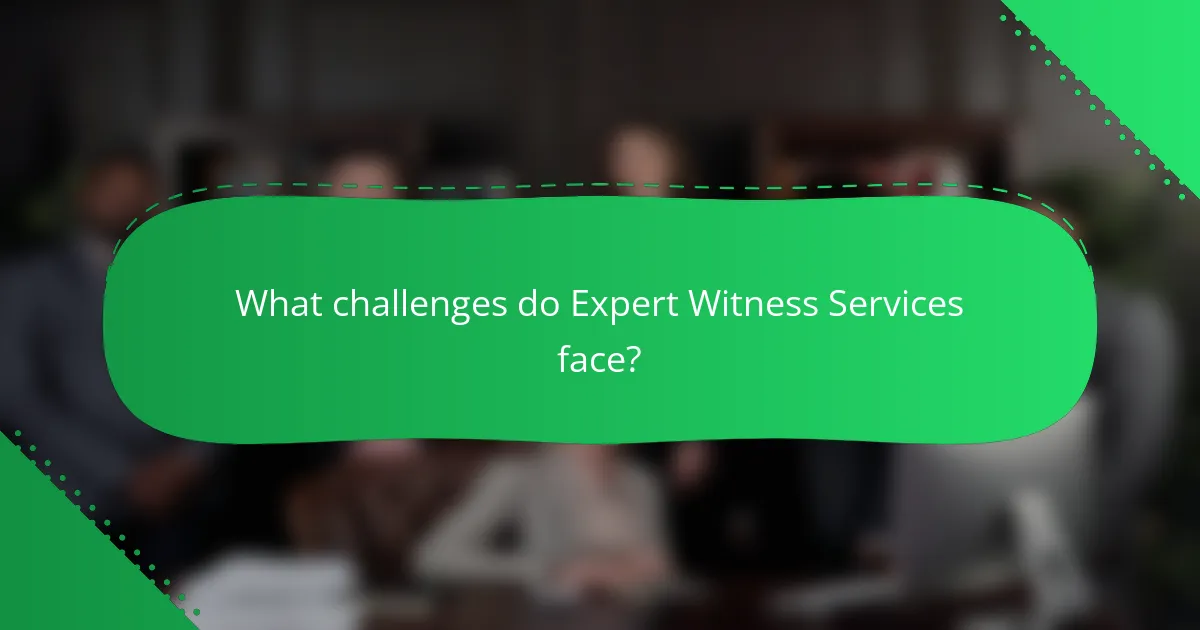
What challenges do Expert Witness Services face?
Expert Witness Services face several challenges. One major challenge is maintaining credibility in court. Expert witnesses must have relevant qualifications and experience to be deemed reliable. Another challenge is the complexity of legal procedures. Navigating these procedures can be daunting for experts not familiar with the legal system. Additionally, experts often face pressure from attorneys to present findings favorably. This can compromise objectivity and integrity. Cost is another significant challenge. High fees can limit access to expert services for some clients. Finally, the varying standards of admissibility across jurisdictions can complicate the use of expert testimony. These challenges impact the effectiveness and reliability of Expert Witness Services in legal proceedings.
What are common issues encountered in expert witness testimony?
Common issues encountered in expert witness testimony include credibility challenges, bias perception, and communication difficulties. Credibility challenges arise when opposing parties question the expert’s qualifications or experience. Bias perception occurs when the expert’s impartiality is doubted due to financial ties or affiliations. Communication difficulties can hinder the expert’s ability to convey complex information clearly to the jury. These issues can impact the effectiveness of the testimony and the overall case outcome. Studies show that jurors often struggle to understand technical jargon, which can lead to misinterpretation of the expert’s findings.
How can bias affect the reliability of expert witnesses?
Bias can significantly undermine the reliability of expert witnesses. It can lead to skewed interpretations of evidence. When an expert has a personal or financial stake in a case, their objectivity may be compromised. This can result in testimony that aligns with their interests rather than factual accuracy. Research shows that biased experts may selectively present data to support their conclusions. This selective bias can mislead juries or judges. Furthermore, cognitive biases can affect decision-making processes. Experts may unconsciously favor information that confirms their pre-existing beliefs. Overall, bias diminishes the credibility and effectiveness of expert testimony in legal proceedings.
What strategies can be employed to mitigate challenges?
Employing effective strategies can significantly mitigate challenges in expert witness services. One strategy is thorough vetting of expert witnesses. This ensures their qualifications and experience align with case requirements. Another strategy is clear communication between legal teams and experts. This fosters understanding of case nuances and expectations. Additionally, utilizing technology for evidence presentation can enhance clarity and impact. Training experts in courtroom procedures can also reduce potential challenges during testimony. Establishing a timeline for expert involvement ensures timely contributions to the case. These strategies collectively enhance the effectiveness of expert witness services and improve case outcomes.
What best practices should legal professionals follow when utilizing expert witnesses?
Legal professionals should adhere to several best practices when utilizing expert witnesses. First, they must thoroughly vet the expert’s credentials and experience. This ensures the expert is qualified in their field. Next, legal professionals should prepare the expert for testimony. This includes discussing case specifics and potential questions. Clear communication about the expert’s role is crucial.
Additionally, legal professionals should ensure that the expert’s testimony is relevant and admissible. They must understand the rules governing expert witness testimony in their jurisdiction. It is also important to establish a clear fee agreement with the expert. This helps avoid disputes over compensation later.
Finally, legal professionals should maintain open lines of communication with the expert throughout the case. This fosters collaboration and ensures that the expert is aligned with the legal strategy. Following these practices enhances the effectiveness of expert testimony in legal proceedings.
How can thorough vetting improve the selection process?
Thorough vetting enhances the selection process by ensuring that candidates possess the necessary qualifications and experience. This process includes verifying credentials, assessing expertise, and evaluating past performance. By conducting comprehensive background checks, organizations can identify red flags that may indicate potential issues. Furthermore, thorough vetting reduces the risk of hiring individuals who lack the required skills for the role. Research shows that organizations that implement rigorous vetting procedures experience better outcomes in case evaluations. For instance, a study by the National Institute of Justice found that properly vetted expert witnesses contribute to more favorable case results. Therefore, thorough vetting is crucial for improving the quality and reliability of selections in expert witness services.
What steps should be taken to prepare an expert witness for trial?
To prepare an expert witness for trial, several key steps should be taken. First, conduct a thorough review of the case materials. This includes all relevant documents, evidence, and legal briefs. Second, hold a detailed meeting with the expert witness. Discuss the case specifics, the expert’s role, and expected testimony. Third, develop a clear outline of the expert’s testimony. This outline should highlight key points and supporting evidence. Fourth, provide training on courtroom procedures. Familiarize the expert with the trial environment and the questioning process. Fifth, conduct mock examinations. This practice helps the expert refine their responses and gain confidence. Sixth, ensure the expert is aware of potential opposing arguments. This preparation allows them to address counterpoints effectively. Lastly, confirm all logistics for the trial day. This includes travel arrangements and timing for their appearance. Following these steps enhances the expert witness’s effectiveness and credibility in court.
Expert witness services provide specialized knowledge and opinions in legal cases, clarifying complex issues for judges and juries. This article outlines the roles expert witnesses play, their necessary qualifications, and how their testimony impacts case outcomes. It discusses the types of expert witnesses, the criteria for their selection, and the challenges faced in providing expert testimony. Additionally, best practices for legal professionals in utilizing expert witnesses are highlighted, emphasizing the importance of credibility and effective communication. Overall, expert witness services are crucial in shaping the direction and results of legal proceedings.
